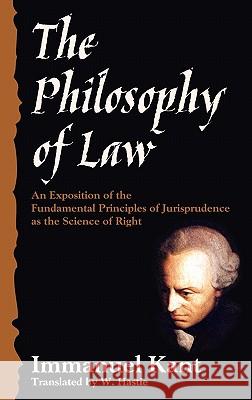The Philosophy of Law » książka
The Philosophy of Law
ISBN-13: 9781584771319 / Angielski / Twarda / 2010 / 302 str.
The Philosophy of Law
ISBN-13: 9781584771319 / Angielski / Twarda / 2010 / 302 str.
(netto: 162,42 VAT: 5%)
Najniższa cena z 30 dni: 169,61
ok. 16-18 dni roboczych.
Darmowa dostawa!
Kant's Master Work Published in 1797, The Philosophy of Law Rechtslehre] stands as one of the most significant late works by the great Prussian philosopher. Though he lived in an atmosphere of political and social repression, it is evident that Kant was sensitive to the revolutionary spirit that was spreading throughout Europe in the wake of Napoleon's armies. Claiming that man is born with reason and an innate desire for freedom, he argued that the union of these natural gifts could bring about a new sense of order and harmony in future generations. This edition also reprints Kant's later Supplementary Explanations (1797), which was added to the second edition (1798). Immanuel Kant 1724-1804] was the foremost thinker of the late Enlightenment and one of the greatest figures in the history of Western philosophy. Concerned principally with epistemology, ethics and aesthetics, his work synthesized trends initiated by Rationalism and Empiricism; it has been a significant influence in the subsequent development of philosophy, religion and law.
Kants Master WorkPublished in 1797, The Philosophy of Law [Rechtslehre] stands as one of the most significant late works by the great Prussian philosopher. Though he lived in an atmosphere of political and social repression, it is evident that Kant was sensitive to the revolutionary spirit that was spreading throughout Europe in the wake of Napoleons armies. Claiming that man is born with reason and an innate desire for freedom, he argued that the union of these natural gifts could bring about a new sense of order and harmony in future generations. This edition also reprints Kants later Supplementary Explanations (1797), which was added to the second edition (1798).Immanuel Kant [1724-1804] was the foremost thinker of the late Enlightenment and one of the greatest figures in the history of Western philosophy. Concerned principally with epistemology, ethics and aesthetics, his work synthesized trends initiated by Rationalism and Empiricism; it has been a significant influence in the subsequent development of philosophy, religion and law.











